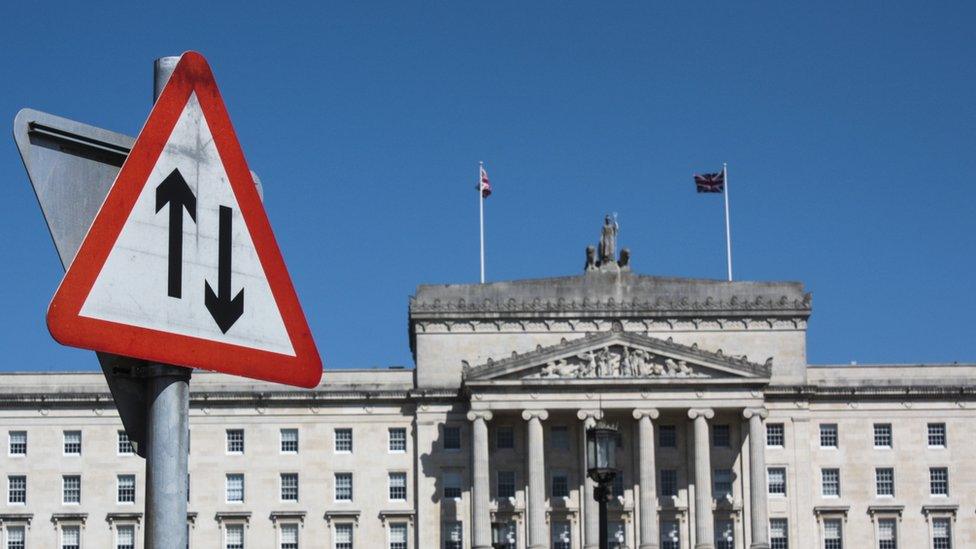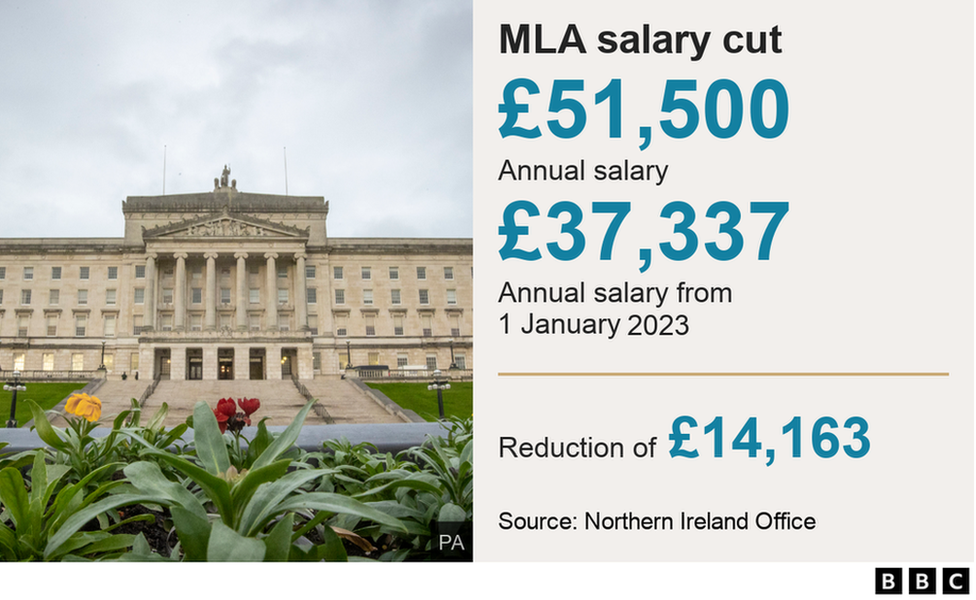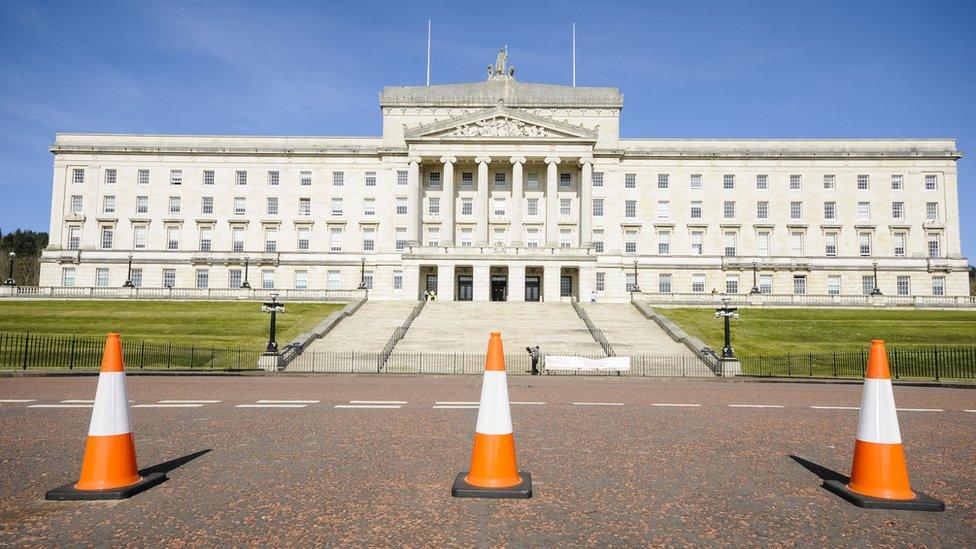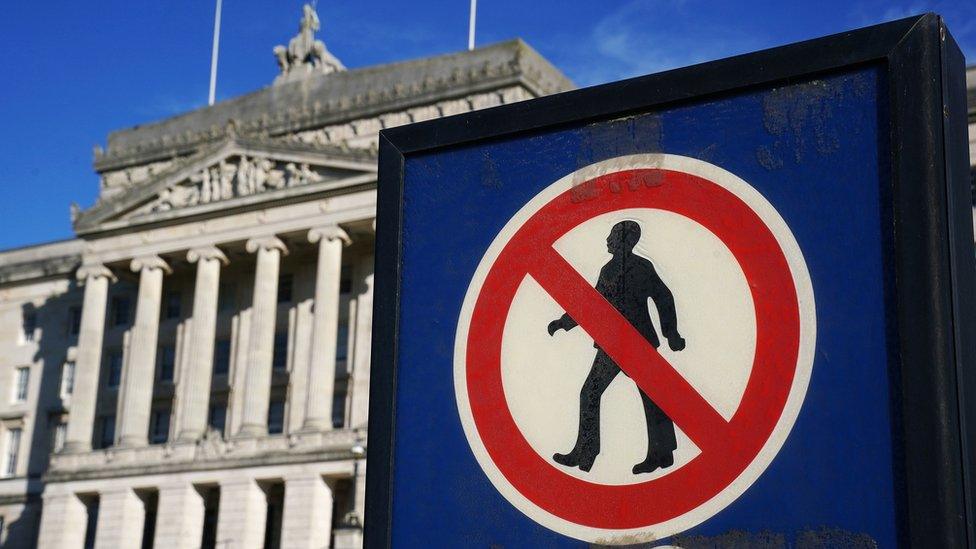Stormont stalemate: MLAs' wages cut by £14,000 from January
- Published

The cut will reduce annual incomes of Members of the Legislative Assembly (MLAs) by 27.5%
Stormont's 90 assembly members will have their salaries cut by more than £14,000 from 1 January, Secretary of State Chris Heaton-Harris has said.
Further cuts may come if the political stalemate continues, he added.
Assembly members have not governed for 10 months due to a boycott by the Democratic Unionist Party (DUP).
Mr Heaton-Harris also told BBC News NI he could not confirm a date for a delayed £600 energy bill discount to be issued to Northern Ireland households.
He said the best way for this to be delivered was through a functioning power-sharing executive.
However, he insisted: "Everyone in Northern Ireland will get the complete payment before everybody in the rest of Great Britain."
In Great Britain, payments began being released in six monthly instalments from October.
'Big push' for further pay cut
Northern Ireland has been without a functioning government since February, when the DUP walked out of the executive in protest against the Northern Ireland Protocol.
Unionists argue the post-Brexit trading arrangement undermines Northern Ireland's position in the UK, as it keeps the nation aligned with some EU trade rules to ensure goods can move freely across the Irish land border.
The assembly sat on Wednesday after a Sinn Féin recall request - a fifth attempt at restoring the executive since the nationalist party won the largest number of seats in May's assembly election.
A motion called on the DUP to end its boycott to help deal with the cost-of-living crisis, but the party again refused to vote for a new Speaker - a position that must be filled before any other business can be heard.

Earlier this week, Mr Heaton-Harris was granted new legal powers to cut by 27.5% the annual incomes of Members of the Legislative Assembly (MLAs).
The pay cut will reduce their salaries by £14,163 - from £51,500 to £37,337.
It will mean a cut of about £800 to their pay packet in January.

The lack of a functioning executive is complicating the delivery of a £600 energy support scheme
Mr Heaton-Harris said there was a strong argument to keep the matter under review.
"I've asked my officials to give me some more legal basis and check if they can do more," he told BBC News NI.
"People will also have seen that when this was being debated in the House of Commons, there was a big push to go further so I'm going to keep it under review."
Chris Heaton-Harris says MLAs' pay will stay under a review after a 27% cut in January
Asked if he was doing enough to try to restore power sharing, the secretary of state said he would convene talks with the parties next week.
It will be the first series of round-table discussions he has held since taking on the job in September.
"I'm putting as much pressure on all parties to go back into the executive, and I do that whenever I see them, and I see them a lot," he said.
"I'm talking to the parties all the time but they could do this themselves."
Mr Heaton-Harris also confirmed the government was "taking soundings" on whether to change the date of next year's scheduled local government election.
The election is due to happen on 4 May, but there have been calls to move it so that the counting of votes does not clash with the coronation of King Charles III, which is happening two days later.
In a letter to all MLAs on Thursday, the secretary of state said he was also increasing the required number of days they must attend Stormont in order to claim travel allowances.
He said it will increase from a minimum of 72 days to 100 with effect from 1 April.
For each working day less than this that an MLA attends the assembly the allowance will be cut by 1%.

Political stalemate explained:
Northern Ireland has been without a functioning government since February, when the DUP walked out of the first minister's role in protest against the NI Protocol
Unionist politicians argue the post-Brexit trading arrangement undermines Northern Ireland's position in the UK
Sinn Féin won the largest number of seats in May's Assembly election, but no new power-sharing executive can be formed due to the DUP's ongoing boycott
Negotiations between the UK government and the EU to resolve differences over the protocol are continuing.
Current legislation means the NI secretary must call an assembly election no later than 13 April if the executive is not restored by mid-January
Read more: A simple guide to the NI Protocol
Related topics
- Published7 December 2022

- Published6 December 2022

- Published30 November 2022
